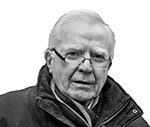Russian oligarchs are named incorrectly. America has oligarchs, men whose extraordinary wealth can sway governments. As Gilens and Page (2014) show, economic elites and big corporations get their way when Congress crafts legislation whereas ordinary citizens have negligible impact.
Wealth and power work differently in Russia. First, its wealthiest businessmen are often kleptocrats; they stole rather than created their wealth. Second, after privatization, Russia enacted a maze of contradictory laws that ensure legal violations during the normal conduct of business. As a result, any businessman that vexes Putin’s can face criminal prosecution and seizure of assets. Unlike American oligarchs, Russian kleptocrats lack power vis-à-vis the government (Applebaum 2014).
Mikhail Khodorkovsky mistakenly thought otherwise. Having acquired Yukos Oil for pennies on the dollar in 1995, he went on to transform it into the most efficient and Westernized company in Russia, a feat that made him Russia’s wealthiest man. Yukos was producing 20% of Russia’s oil. He also became a pro-democratic reformer. As a result, Putin had him arrested and convicted to 14 years in jail on trumped up tax fraud charges. Yukos was seized and nationalized. Putin quickly brought all other kleptocrats — and oil companies — under his thumb.
Following the Soviet Union’s collapse in 1991, Russia rapidly privatized state property, such as Yukos. Faced with economic chaos, hyperinflation, widespread crime, and vanishing revenues, the government sold property quickly in rigged auctions with fire-sale prices. Chaos also created openings for criminal gangs to forge ownership papers, violently evict legitimate property owners, sell their assets, and launder the gains overseas.
When Putin became president in 2000, criminal “asset theft,” or reiderstvo, was governmentalized. Armed thugs at the door were replaced by tax auditors and police with arrest warrants. Seized property would be renationalized or seized for allies, friends, or relatives of Putin.
Putin’s chief targets were oil and gas and the media; both helped consolidate his now unchecked power. Oil generated more than half of Russia’s exports and almost half of government revenues (Cohen 2019). Takeover or closure of media eliminated the one institution capable of exposing him. There is good reason why George Orwell’s “1984” is a best seller in Russia today. Putin’s propaganda machine increasingly resembles Big Brother’s Ministry of Truth in “1984.”
Putin’s rule — “stay loyal and you’re free to steal” (Milov 2011) — has spread from the upper reaches of government down to low-level functionaries and then throughout Russian society. Asset theft is one of the most profitable activities in Russia today; at an average cost of $150,000, asset thieves can seize and sell off assets that will net $3 to $4 million (Shelly & Deane 2016).
And reiderstvo is spreading rapidly to target everything from private kindergartens and other small businesses through tank factories and Western investment firms. Universities, hospitals, theaters located on prime real estate and holders of intellectual property have become targets of asset theft as well. No one — no asset — is safe. Entrepreneurs in particular have become an endangered species (Krylova 2021.)
Putin has placed an exclamation point behind the oil-corruption complex by creating the ultimate petrostate, more correctly a petrokleptocracy. His dark, oily rule casts a shadow over democracy everywhere.
References
Applebaum, Anne. 2014 (Dec 18). How Putin and His Cronies Stole Russia. New York Review; https://www.nybooks.com/articles/2014/12/18/how-he-and-his-cronies-stole-russia/?lp_txn_id=1431561
Cohen, Ariel. 2019 (May 31). Russia’s Oily And Gassy Crony Capitalism: The Path To Kleptocracy. Forbes; https://www.forbes.com/sites/arielcohen/2019/05/31/russias-oily-and-gassy-crony-capitalism-the-path-to-kleptocracy/?sh=61f24a1e3b97
Gilens, Martin & Benjamin I. Page. 2014. Testing Theories of American Politics: Elites, Interest Groups, and Average Citizens. Perspectives on Politics; https://politicalanthro.files.wordpress.com/2014/09/gilens-and-page-2014-testing-theories-3-7-14.pdf
Krylova, Yulia, et al. 2021 (Jun). Reiderstvo 2.0: The Illegal Raiding Pandemic In Russia. Transnational Crime & Corruption Center; https://reiderstvo.org/wp-content/uploads/2021/06/Reiderstvo-2.0-The-illegal-raiding-pandemic-in-Russia-1.pdf
Milov, V., et al. 2011. Putin. Corruption. An independent white paper; https://www.putin-itogi.ru/putin-corruption-an-independent-white-paper/
Shelley, Louise & Judy Deane. 2016. (May 9). The Rise Of Reiderstvo. Transnational Crime & Corruption Center; https://reiderstvo.org/sites/default/files/The_Rise_of_Reiderstvo.pdf


Recent Comments